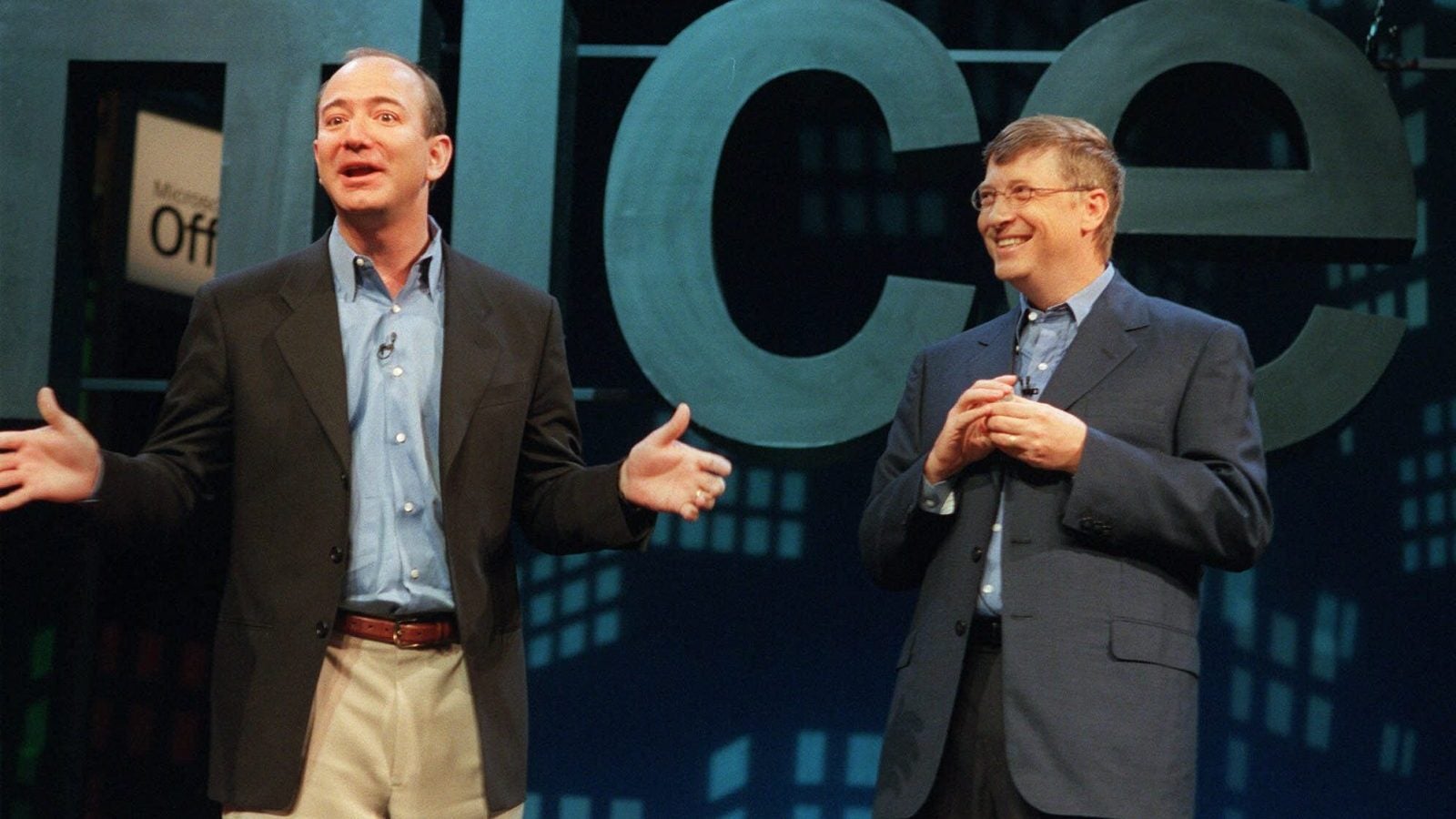Advice for Jeff Bezos on testifying before Congress from me, the totally real Bill Gates
In a hearing on July 29, Apple’s Tim Cook, Alphabet’s Sundar Pichai, Amazon’s Jeff Bezos, and Facebook’s Mark Zuckerberg will appear—virtually, at least—before the US House Judiciary Antitrust Subcommittee. The four will take questions over accusations of antitrust abuses at their companies.


In a hearing on July 29, Apple’s Tim Cook, Alphabet’s Sundar Pichai, Amazon’s Jeff Bezos, and Facebook’s Mark Zuckerberg will appear—virtually, at least—before the US House Judiciary Antitrust Subcommittee. The four will take questions over accusations of antitrust abuses at their companies.
It’s the biggest antitrust hearing in the US since Microsoft’s back in 1998. Bill Gates was widely considered to come off like an evasive jerk in his testimony at the time … Which means he is now perfectly positioned to help Jeff Bezos learn from his mistakes in the Amazon titan’s first appearance before Congress.
Quartz was fortunate enough to intercept the following message from one tech titan to another.
Jeff, buddy!
There are some important milestones in the life of a billionaire tech CEO. The first time you think, “Hey, maybe it would be cool to cheat death.” Your first private plane that’s big enough to escort a smaller private plane. Finding out what it’s like to be attacked with a cream pie. That moment when you start getting weird about the moon.
And of course, the first time you testify in a Congressional antitrust hearing.
I remember my own hearing like it was yesterday. It was 1998. At 42 years old, I was the richest man in America, and the shoulders on my suits were as big as my ambitions.
Microsoft and I were riding high, what with Windows’ 90% market penetration and Internet Explorer on the rise. I was feeling good. Confident, even cocky. A teensy bit annoyed, as scholars who study Microsoft would later suggest, at the hassle of being called into DC to defend my computer revolution in the first place. “The view was that government was irrelevant and we can do anything we want,” Harvard Business School professor David Yoffie told the Atlantic. “There was little respect for government, and that was the culture inside Microsoft at the time.”
Well, sure! You get that, Jeff, don’t you? I know you’ve said that it’s reasonable for large corporations like Amazon to receive government scrutiny. I know you know that Amazon has an estimated 44% market share among e-commerce companies in the US, and that your cloud computing business is so dominant that even your competitors use it. (Ol’ Microsoft is coming for you on that one, though. You just wait.)
But you also say Amazon isn’t a monopoly, no way, no how. That’s what I came to tell Washington, back in the day.
Jeff, I’ll be honest: It didn’t go great.
I mean, look, I thought it went great at the time. I went in swinging. When Orrin Hatch asked whether Microsoft had tried to prevent internet content providers from promoting Netscape, he added, “and I guess when I say Microsoft, I mean, you too.” I wasn’t going to stand for that! I was all, “What do you mean, me too?” I’d personally never met with any content providers!
I was feeling feisty, like a person who had definitely never had any cream pie thrown at him. I told those senators they should knock off the regulation talk and be grateful for everything Microsoft had done for America. I told them, “The computer-software industry is not broken, and there is no need to fix it.”
Well, you know what happened next: The Department of Justice decided we had a monopoly, sued Microsoft in a lawsuit that went on for years, and ultimately won. Microsoft lost its dominance. I stepped down as CEO.
Look, it’s all water under the bridge for me now. But as I’ve said before, I regret “taunting” regulators. “Not something I would choose to repeat,” as I’ve said. Not my best moment.
It’s like I told the New Yorker, back when Mark Zuckerberg started coming up against Washington: “Somebody who is smart, and rich, and ends up not acknowledging problems as quickly as they should will be attacked as arrogant. That comes with the territory.”
So when you talk to Congress next week, acknowledge problems. Make nice. Act normal. Don’t call anyone “alive girl” or suggest going out later for roasted iguana.
And remember, if things don’t go your way, you can always get into philanthropy. I know you’re not a huge fan. But it’s worked out pretty well for me.
Correction: A previous version of the article said “So when you talk to Hatch next week, acknowledge problems.” Sen. Hatch retired from Congress in January 2019.